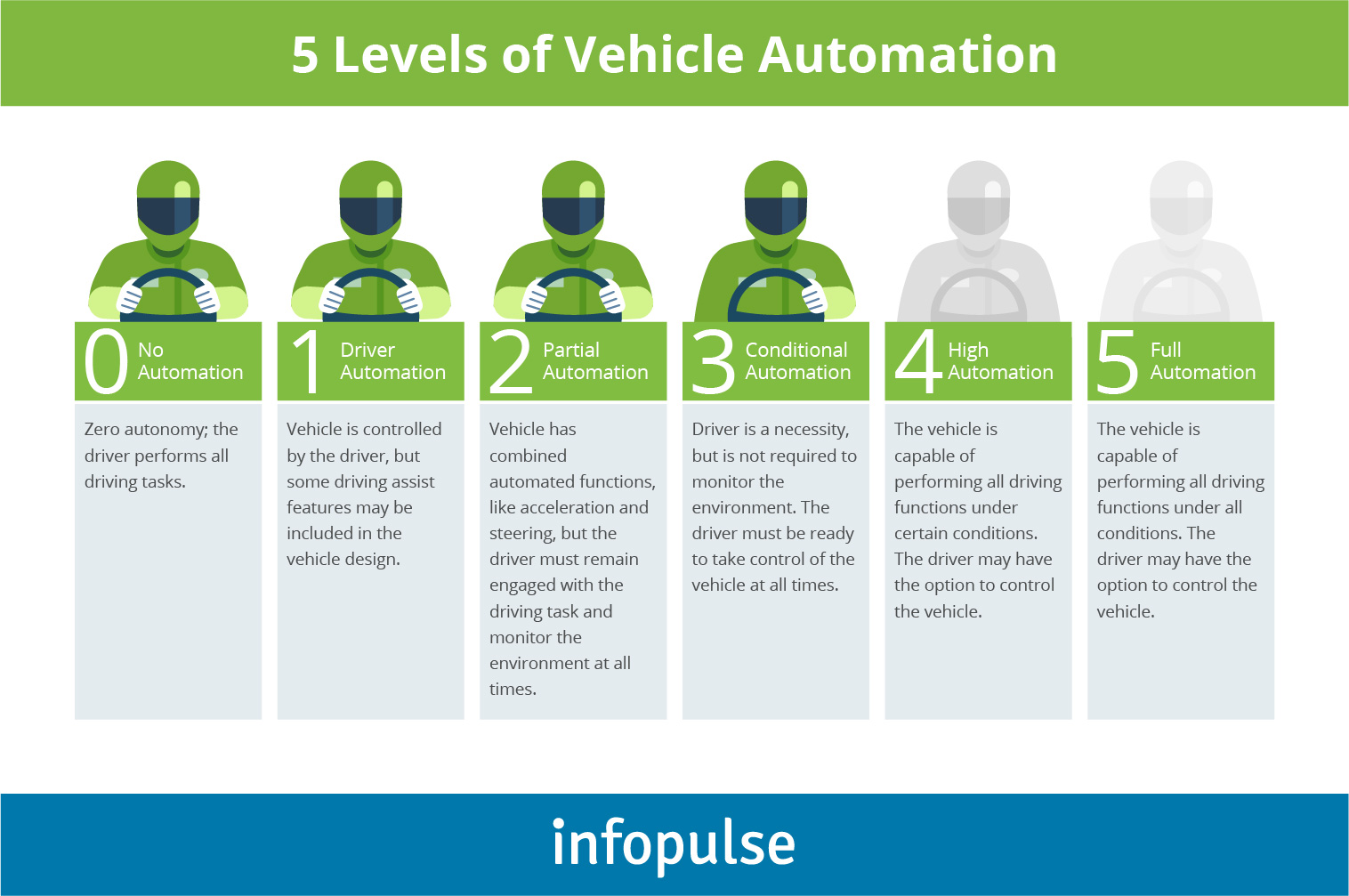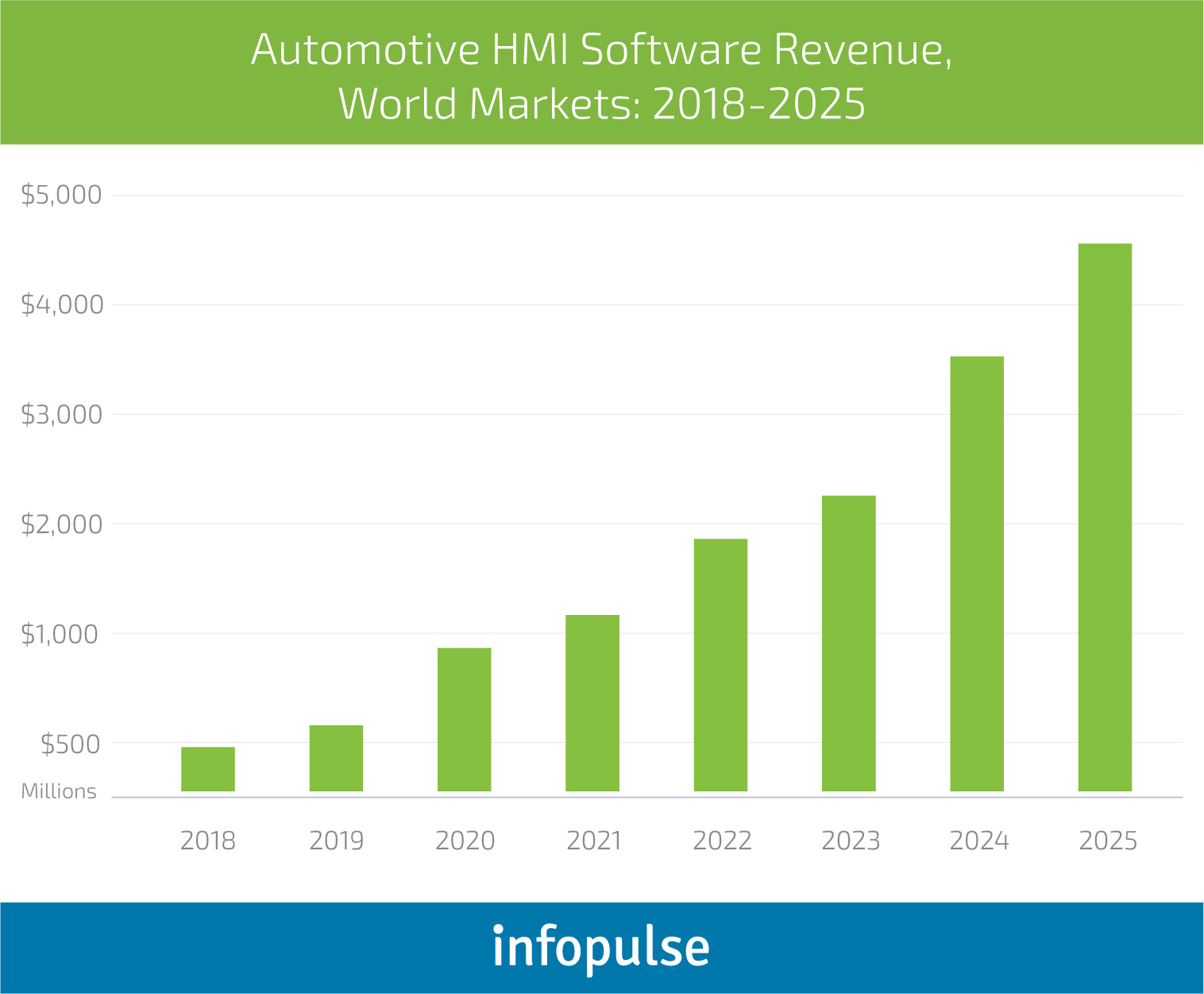Redefining Automotive Industry with Artificial Intelligence
AI-driven Autonomous Vehicle Technology
Today a self-driving vehicle is the most prominent novelty in the automotive industry. To build such a car, you’ll need advanced software, hardware and an array of innovative technical components such as Lidar, radar, sensors with front cameras, numerous ultrasonic and odometry sensors, a GPS system and a central computer that processes the captured data. The baseline tool that powers the entire combination of these complex technologies is artificial intelligence. AI-enabled smart navigation system is able to recognize nearby objects, such as cars, pedestrians or any other road obstacles, thus helping avoid collisions and enhance safety on the road.
The Society of Automotive Engineers (SAE) and the National Highway Traffic Safety Administration (NHTSA) have established five levels of vehicle automation. Their ranking defines the level of vehicle intelligence and automation capabilities. For example, advanced driver assistance system (ADAS) and Partial Automation systems only support a driver in performing the crucial tasks such as steering, braking or accelerating. Usually, such systems provide simple warnings, alerts or instructions how to improve driving based on the gathered data about road conditions and other vehicles. Among the most common assistance features are forward collision warning, adaptive cruise control, blind spot warning, lane departure warning, etc. However, such systems can also have some advanced functionality offering momentary assistance in hazardous situations. It means that a car can take control of itself and can either slow down, accelerate or fully stop if needed. Enabling such features takes us closer to Level 3, when the system can substitute you in steering, parking, etc. However, at this point, a driver should keep his hands on the wheel to step in if it’s required.

The current state of autonomous vehicle development covers Level 2 to 3. Although Level 4 is being actively developed by Nissan and Volkswagen, the full automation has not been achieved yet. Nevertheless, autonomous vehicles are very promising from the business viewpoint. The implementation examples may include:
- Faster and more profitable delivery with autonomous vehicles or smaller AI-based delivery robots;
- Self-driving transportation boxes that may function as coffee shops or beds on wheels;
- Robotic taxis with improved safety, less fuel consumption, and lower maintenance costs;
- A platoon of driverless trucks, which can significantly reduce the fleet management cost.
Apart from autonomous vehicles, artificial intelligence has a lot more to offer to the automotive industry. AI has the potential to ultimately transform the in-vehicle experience by introducing a broad spectrum of novel features, and innovate the vehicle manufacturing process, make it more productive and cost-efficient.
Creating Exceptional In-vehicle Experience with AI
Currently customers expect their next-gen cars come with increased convenience and new in-vehicle entertainment features. To meet this demand, automotive entrepreneurs focus on improving Human Machine Interface (HMI) creating more intuitive in-vehicle experience.
Artificial intelligence is the backbone of HMI innovations. Recent Tractica report forecasts that the global market of AI-driven automotive HMI software will increase from $462.8 million in 2018 to $4.6 billion by 2025, with a primary focus on the driver’s experience, safety, and infotainment systems.

Artificial intelligence is an integral part of the natural language processing (NLP) used in the vehicle’s HMI and infotainment systems to understand complex sentences within a specific context and provide a natural response to the driver. The queries may include common questions, requests to perform conversions and calculations, provide time zone data or start a local search (e.g., What is the nearest Italian restaurant that has free WiFi and parking?) The AI-based voice assistant will quickly respond to the driver’s questions and offer all available options. One of the most prominent use cases of AI-based vehicle voice assistants is the Mercedes-Benz MBUX, which perfectly understands a driver and features smart visuals.
Artificial intelligence may be implemented to further advance the in-vehicle experience and create unparalleled opportunities that benefit the driver’s comfort. AI-driven connected cars can create calendar appointments, make and receive phone calls, or even include an in-car payment system. Moreover, AI-based vehicle systems may be integrated with the user’s social media account and deliver personalized experience and contextual suggestions in terms of music, points of interest, and news feed.
Adopting artificial intelligence into your automotive practices will allow creating a wide range of in-vehicle features to improve customer experience and satisfaction.
Enhancing Smart Vehicle Manufacturing with AI
Automotive assembly lines may face unexpected failures resulting in significant financial losses and production outage. Employing AI coupled with advanced analytics, automakers can automate and speed up processing of massive data quantities, detect the production anomalies, predict and prevent possible disruptions in the future.
Furthermore, AI-powered computer vision ensures accurate quality control by scanning various machine parts or entire car bodies, and instantly informing about the defects. Audi is employing AI-driven smart cameras to identify defects in their metal sheets. The system inspects millions of images with high precision and is able to detect even the smallest cracks, which prominently improves the company’s quality control. Infopulse used another approach applying predictive analytics to improve quality of stainless steel slabs decreasing costs for defects detection.
Alternatively, AI in manufacturing can be implemented to create an efficient human-robot collaborative environment. Automotive manufacturers can adopt AI to create flexible and context-aware robots that will work alongside with humans. These robots may help employees to perform daily repetitive tasks, which will benefit productivity and accelerate vehicle production, while also improving the safety of employees.
One of the challenges automotive manufacturers deal with is complex supply chains that operate globally and include a large number of intermediaries. These challenges include poor supply chain visibility and unpredicted impact of external factors. Artificial intelligence has the potential to resolve these issues and add value to the automotive supply chain. AI is able to process data from various sources, like social media or weather reports, and deliver accurate demand forecasts. Additionally, AI can be used to improve inventory tracking, planning, and management, which benefits the supply chain visibility, and allows accelerating the key processes within the supply chain.
Conclusion
Artificial intelligence offers an array of business growth opportunities for automotive entrepreneurs. Implementing AI can create a multitude of novel in-vehicle features like smart voice assistants, or in-car payment systems that create an extraordinary customer experience. AI can improve the efficiency of automotive supply chains with accurate demand forecasting and inventory management. Moreover, AI adoption allows creating a productive and secure human-robot environment, while simultaneously benefiting the production quality control.
Infopulse has strong expertise in developing sophisticated AI and data science solutions for a wide range of business sectors. The solutions include advanced virtual assistants, chatbots, support solutions, and financial forecasting tools. Our team would be glad to provide further consulting in terms of AI adoption for your automotive business.

![Pros and Cons of CEA [thumbnail]](/uploads/media/thumbnail-280x222-industrial-scale-of-controlled-agriEnvironment.webp)
![BPO in Telecom and BFSI [Thumbnail]](/uploads/media/thumbnail-280x222-ways-business-process-outsourcing-bpo-can-help-telecom-bfsi-and-other-industries-advance.webp)
![Cloud-Native Maturity Model Assessment [thumbnail]](/uploads/media/thumbnail-280x222-what-Is-the-cloud-native-maturity-model-definition-and-assessment-criteria.webp)
![Power Platform for Manufacturing [Thumbnail]](/uploads/media/thumbnail-280x222-power-platform-for-manufacturing-companies-key-use-cases.webp)

![Containers vs VMs for Microservices [thumbnail]](/uploads/media/thumbnail-280x222-containers-vs-vms-what’s-better-for-microservices.webp)
![Accelerated Development with Azure DevOps Toolset [thumbnail]](/uploads/media/thumbnail-280x222-how-to-improve-developer-velocity-with-azure-devops.webp)
![10 Lessons Learned: AWS Migration [Thumbnail]](/uploads/media/thumbnail-280x222-10-lessons-learned-on-aws-migration.webp)
![Cloud FinOps Implementation Roadmap [Thumbnail]](/uploads/media/thumbnail-280x222-cloud-finops-why-you-need-it-and-how-to-get-started.webp)
![Challenges of Low-code vs Custom [TN]](/uploads/media/thumbnail-280x222-how-to-overcome-the-challenges-of-low-code-and-custom-solutions-development-expert-advice.webp)